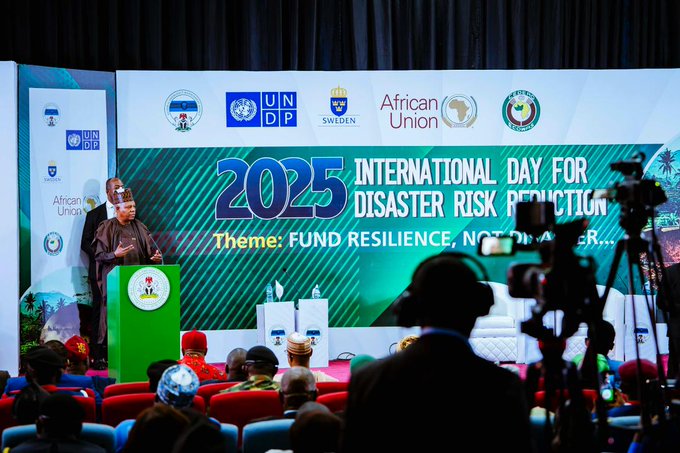The Federal Government, FG, has announced a plan to empower communities susceptible to flooding and other disasters to take ownership of their own safety management.
Vice President Kashim Shettima announced this yesterday in Abuja at the 2025 International Day for Disaster Risk Reduction (IDDRR).
Shettima emphasised that preparedness efforts will only yield tangible results if communities are equipped to manage their own safety.
READ ALSO: ASUU Strike: Don slams FG’s no-work-no-pay policy, urges respect for university lecturers
“None of these efforts will yield results unless we empower and support our communities to take ownership of their safety. They are the foundation of whatever strategy we adopt and the heartbeat of our national resilience,” he stated.
Shettima applauded the IDDRR theme, “Fund Resilience, Not Disasters,” noting that it highlights the truth that it is “far wiser, far cheaper, and far more humane to prepare for disasters before they strike than to rebuild after they destroy.”
He noted that every investment in preparedness saves more on response and recovery costs.
To finance this resilience, Shettima identified key priority areas for investment, including “drainage systems, not relief camps; to build stronger schools and hospitals, not temporary shelters; to support farmers with climate-smart tools, not just food aid after floods; and to train and equip our first responders before the sirens start to wail.”
Shettima described this as the required shift from reacting to crises to anticipating and preventing them.
Shettima detailed the government’s strategy, noting that following President Bola Tinubu’s directive, the administration is integrating disaster risk reduction into every sector, including agriculture, infrastructure, education, and health.
He added that the government is expanding early warning systems and is actively “strengthening state and local emergency management agencies through training, technology, and coordination support.”
He also stressed the need for a strong partnership with the private sector, urging businesses to embed risk reduction into corporate planning and investment decisions.
Furthermore, he called upon academia and research institutions to generate the necessary data, innovation, and practical research to guide decision-making.
Earlier at the event, the Director General of the National Emergency Management Agency (NEMA), Hajiya Umar, stated that the commemoration marks a defining moment in Nigeria’s commitment to building resilience and pushing for a more proactive and better-financed disaster resilience framework.
READ ALSO: FG urges ASUU to halt strike, threatens ‘no work, no pay’ rule
Other stakeholders, including Zamfara State Governor Dauda Lawal and the Minister of State for Humanitarian Affairs and Poverty Reduction, Yusuf Sununu, called for deepened collaboration, the adoption of a Public-Private Partnership model for funding disaster management, and diversification of the nation’s funding sources.
Both the Senate and House of Representatives Committees on Disaster Management also pledged legislative support for NEMA, including efforts to amend the NEMA Act.



